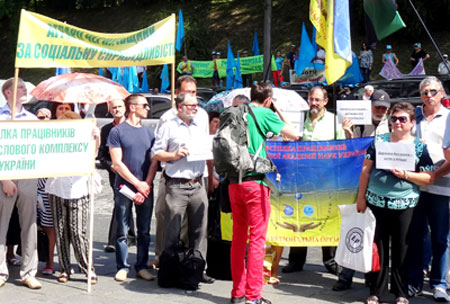DNEPRODZERZHYNSKA, Ukraine — “In 2014, our titanium processing plant reverted from private back to state ownership,” Sergei Alexeivych, head of the independent trade union at the plant in Volnog-orsk, told the Militant here June 4. “The 4,500 workers were transferred, with one exception — me, the head of the union. They ‘lost’ my application, the journal with my job number, everything about me.
“Titanium is one of the most profitable products worldwide, used in making rockets, airplanes, submarines and replacement joints for people,” he said. “Now the state wants to privatize the plant again, so someone can get rich. Management is running it into the ground.
“Even though they tell us there is no work, you can see the raw ore piled 15 to 20 meters high [49 to 65 feet] all around the plant,” Alexeivych said, showing us pictures.
Andrey Zaykov, who works at a peat plant in the northwestern city of Chernihiv, told a similar story. “The plant, which makes equipment and uses peat to generate energy, has had 19 different managers over the last 10 years,” he said in a June 1 interview. “In 2012 new bosses sucked all the wealth out of the plant — we had no contracts, no power, it was an empty shell while they got rich.
“New managers came in, got it going again and were fired,” said Zaykov, who is the head of the Confederation of Free Trade Unions in his region. “We haven’t been paid since January and the plant has stopped work. I helped lead a campaign for back pay and they trumped up charges against me. I was fired at the end of April.
“They set up a fake private enterprise and got a secret agreement from the state to transfer the company’s assets over,” he said. “This is all about corruption, money and privatization.
“The government doesn’t want to listen to us,” Zaykov said. “The only thing we can do is organize to fight, like we did at Maidan,” referring to the massive movement that led to the overthrow of the pro-Moscow regime of Viktor Yanukovych in February 2014.
Over a week and a half, Militant reporters also met with uranium miners at the Smolensk mine in the southeast, iron ore miners in Krivyi Rih, workers at the Yashmash rocket and Interpipe plants in Dnepropetrovsk, rail workers here and in Kiev, and others, learning about their struggles to defend jobs, wages, working conditions and political rights.
The picture they paint is that the bosses in Ukraine — both in private and state enterprises — and their government in Kiev are engaged in an all-out drive against workers and independent unions. They seek to increase profitability and position themselves to seize mines, mills and plants scheduled for privatization at bargain prices, while battling other oligarchs who have amassed fortunes from theft and corruption.
They also attempt to use workers’ commitment to Ukraine’s national sovereignty to demand economic “sacrifice” and curtailment of rights in face of ongoing attacks from separatist forces in Donetsk and Luhansk, backed by Russian troops and weapons, and Moscow’s continued occupation of Crimea.
Workers pay for deep economic crisis
Ukraine’s capitalist economy is spiraling into crisis, mostly on the backs of the working class and farmers. Industrial output has dropped 20 percent while $7 million a day is eaten up by military expenditures. Inflation has soared 61 percent over the last year while jobs have shut down, wages are frozen and often not paid. Prices of many basic necessities have doubled and tripled.The situation of workers trapped under the so-called People’s Republics in Donetsk and Luhansk is even worse, with mines closed, industry shuttered, and work, supplies and rights gone.
The Kiev government of President Petro Poroshenko, pushed by the International Monetary Fund and imperialist “allies,” has slashed energy and other social subsidies, cut pensions, and plans to eliminate tens of thousands of jobs in an orgy of privatization.
Coal miners, the strongest section of the labor movement, are a special target. According to Energy Minister Volodymyr Demchyshyn, the government’s goal this year is to eliminate 10,000 mining jobs out of 52,000, closing five state-owned mines and idling seven more.
“There are 1,800 state-owned companies left,” Poroshenko told parliament in his June 4 national address. “No more than 200 are vital to the state.”
He called the massive primitive accumulation of capital by a layer of emerging capitalists, many with connections to the old Soviet bureaucracy, over the 25 years since the implosion of the Soviet Union, a necessity. “Any scientist who investigates the typology of political regimes says that the so-called competitive oligarchy is really better than authoritarianism,” he said. Poroshenko is one of Ukraine’s richest capitalists.
Claiming it is now time for a “transitional step towards liberal democracy,” Poroshenko is embroiled in a series of fights with other oligarchs over who controls what. “It is not a suitable moment for social democracy,” Poroshenko said, outlining his perspective for who should pay for the “next step.”
“Thatcherism and Reaganomics will be more useful now,” he said. Prime Minister Margaret Thatcher was the architect of dismantling the coal industry and assaulting the miners union in Britain in the 1980s, at the same time U.S. President Ronald Reagan’s smashing of the air traffic controllers union signaled decades of attacks on working people.
Poroshenko’s government is pushing a new labor code that will place greater obstacles in the way of forming unions and defending workers. He called for slashing state-subsidized health care, saying, “We cannot deceive people with fairy tales about free medicine.”
And he denounced anyone who protests these moves — which he admitted are “difficult and very unpopular decisions” — as “fifth columnists” aiding Moscow. “The enemy does not hide its plan to convert the discontent of tired and exhausted Ukrainians into the destabilization of the situation in our country,” Poroshenko said. He singled out the independent miners union, saying their mobilizations are nothing but “the clank of weapons of private armies camouflaged as miners.”
Miners leading fightback
Miners have blocked roads, marched on local offices and mobilized in the nation’s capital. In one protest in the west they sat in the road behind a sign reading, “The revolution of dignity goes on.”“The government attacks trade union rights and their mine closures and other cuts are tearing up life for working people,” Mikhailo Volynets, president of both the Confederation of Free Trade Unions and independent miners union, told the Militant May 29. “The social tensions point toward another Maidan.”
“Our unions are dedicated to the national sovereignty of Ukraine,” he said, “but that has nothing to do with the course of the government. When we need energy and to break with dependence on gas and coal from Russia, they close Ukrainian mines, throw miners out of work and turn to imports.
“People are losing their trust in the government,” he said. “They pressure the media not to cover what the union says and they slander us as paid agents of Moscow. Workers come to me on the street and on the subway and tell me they don’t believe the ministers.
“In the fall of 2013, when the students took to the streets in Maidan to demand change and national sovereignty, they were met with truncheons and bullets. The unions and the workers joined and tens of thousands turned out,” Volynets said. “Only then did these politicians show up and build careers and power out of it.”
“Now they tell workers and others that we are anti-patriotic,” he said. “Well, the independent unions are spreading and growing. We have thousands of new members. Some in the old state unions are turning to us. And we are going to continue to fight.”
Related articles:
Ukraine anti-communist laws: an attack on the working class
Ukraine: stop attacks on political rights!
|
Printer-friendly version of this article |















